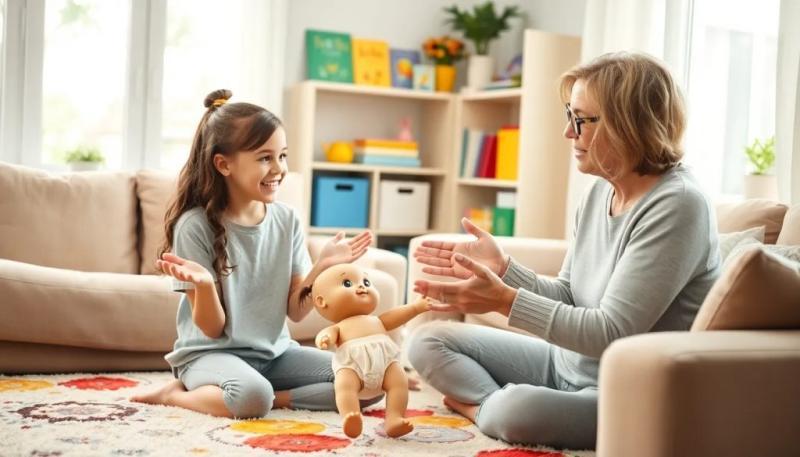To ensure that your teenager becomes a responsible and confident babysitter, effective training is essential. This not only prepares them for the job but also equips them with valuable life skills. In this guide, we will explore various aspects related to "how to train your teenager as a babysitter", including key skills, responsibilities, and communication tips.
How to become a babysitter at 11, 12, 13, 14, or 16?
Becoming a babysitter at a young age can be a rewarding experience. At ages 11 to 16, teenagers can start learning the essential skills needed for babysitting. Many families look for responsible young individuals to care for their children. Starting early allows teens to build a foundation for future jobs in childcare.To begin, it's important to check local laws and regulations regarding babysitting ages. Often, teens as young as 11 can start babysitting with supervision. Here are some steps for them to consider:- Learn basic child care skills.
- Take a babysitting course to gain confidence.
- Practice with younger siblings or family friends.
- Ask parents or guardians for feedback and guidance.
What skills are essential for a teen babysitter?
When training a teenager to become a babysitter, it’s crucial to focus on essential skills for teenage babysitters to learn. These skills will not only help in their babysitting jobs but also in their personal and professional lives.Some vital skills include:- First Aid and CPR: Certification in First Aid and CPR is invaluable.
- Effective communication: This includes listening to children and discussing with parents.
- Problem-solving: Handling unexpected situations calmly and effectively.
- Time management: Balancing playtime, meals, and nap times efficiently.
How can teenagers prepare for their first babysitting job?
Preparation is key when it comes to a teenager's first babysitting job. This includes both mental and practical readiness. Here are some tips on how to get started:1. Know the child’s routine: Familiarize yourself with the child's daily activities, such as meal times and bedtimes.2. Discuss expectations with parents: Effective communication with parents about their rules and routines is essential.3. Dress appropriately: Wear comfortable clothing that allows for movement, and avoid distractions like excessive jewelry.4. Bring engaging activities: Have games or crafts in mind to keep the children entertained and engaged.Additionally, the importance of being punctual cannot be overstated. Arriving early allows the babysitter to set up and bond with the children before the parents leave.What are the key responsibilities of a babysitter?
Understanding the key responsibilities of a teenage babysitter is crucial for a successful experience. A babysitter is not just a caregiver; they also need to be a role model. Some of the primary duties include:- Ensuring the safety and well-being of the children.
- Preparing meals and snacks as needed.
- Engaging children in activities that promote development.
- Maintaining a clean and organized environment.
How to communicate effectively with parents as a babysitter?
Effective communication is essential for any babysitter. It helps build trust and sets clear expectations. Here are some tips for effective communication with parents:1. Establish clear rules: Ensure both the babysitter and the parents are on the same page regarding house rules and expectations.2. Regular updates: Use text messages or calls to update parents about their children's activities and behavior.3. Ask for feedback: After the job, ask parents how it went and if there are areas for improvement. This shows a willingness to grow and learn.Being respectful and showing professionalism can go a long way in creating lasting relationships with families looking for babysitters.What are the benefits of taking a babysitting course?
Taking a babysitting course can greatly enhance a teenager's preparedness and confidence. Here are some reasons why enrolling in a course is beneficial:- Knowledge and skills: Courses provide essential information on child care, safety, and emergency procedures.- Certification: Obtaining certification from recognized organizations, like the American Red Cross, increases employability and builds trust with parents.- Networking opportunities: Meeting other teenagers in the course can lead to potential job opportunities and friendships.Many courses also offer hands-on experience, which is invaluable in real-life situations.Related questions about babysitting training for teenagers
How to be a good teenage babysitter?
To be a good teenage babysitter, it's important to be responsible, reliable, and caring. Building a rapport with the children, engaging them in fun activities, and keeping them safe are essential. Additionally, being punctual and well-prepared shows professionalism.How much should a 15 year old babysitter get paid?
The pay for a 15-year-old babysitter varies by location and experience, but typically ranges from $10 to $15 per hour. Factors such as the number of children, special needs, and location can also influence the rate.What is the number one rule in babysitting?
The number one rule in babysitting is to ensure the safety of the children at all times. This includes following house rules, being aware of the children’s activities, and knowing emergency procedures.What are the three biggest responsibilities of a babysitter?
The three biggest responsibilities of a babysitter include ensuring the children's safety, providing care and supervision, and engaging them in age-appropriate activities. Maintaining open communication with parents is also crucial for a successful babysitting experience.En este sentido, te invitamos a ver el siguiente video que te guiará sobre cómo entrenar a tu adolescente para que se convierta en un excelente niñero.




